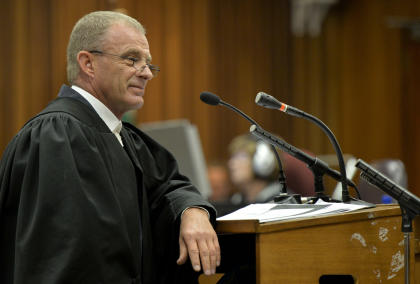Oscar Pistorius Trial Day 38: Prosecution makes final push to paint Blade Runner as a killer
PRETORIA, South Africa – Prosecutor Gerrie Nel ended his lengthy cross-examination with the defense's star witness exactly where he wanted him.
Over his three days on the stand, professor Wayne Derman, a sports physician, gave compelling testimony, describing how Paralympian Oscar Pistorius' disability made him vulnerable and deeply fearful; how it might cause him to make different decisions than an able-bodied person facing a perceived attacker.
Much of Judge Thokozile Masipa's decision – murder or a lesser charge – will rest on what she believes to be the athlete's intent in firing his 9mm at a locked bathroom door in the early hours of Valentine's morning last year, when he shot and killed his girlfriend Reeva Steenkamp.
And that is where Nel chose to end his interrogation of ostensibly the defense's last witness.
Intent to kill
"He [Pistorius], with intention to kill, shot the person behind the door. That's what he wanted to do, and that's what he did. Do you want to comment on that?" Nel asked Derman.
"I understand that," the professor said.
"Is that all?" Nel said, raising his eyebrows. "And I put to you that your evidence in no way affects his intention on the night. You have no comment?"
"Is it my job to do that? Is that not the court's job to do that?" Derman retorted.
"Do you want to respond to what I just put to you? Yes or no?" Nel pressed. "You're an expert, sir. You can say, 'I don't want to respond.' That's fine."

"From what I understand, my lady, it was his intention to shoot. That's how I understand it," Derman told the judge.
Nel smiled.
"I have nothing further," he said.
The Paralympian maintains that when he shot and killed Steenkamp that he believed her to be an intruder.
The state's case for murder relies on showing that Pistorius intended to fire his pistol four times through his toilet door, even with the knowledge that he could kill the person on the other side.
In order to avoid a murder conviction – which carries a minimum 15-year prison sentence – the star athlete must convince the judge and her two assessors that he feared for his life and felt he had no option but to shoot.
Derman testified that the double-amputee was reacting to three separate auditory-triggered "startles:" the sound of his bathroom window opening, his toilet door slamming and a third noise from the cubicle, as he stared at the closed door, believing a burglar was inside.
"When you are in a fearful state, and you are expecting that noise, but you are also expecting an adverse reaction, the fear-potentiated startle is exaggerated," the professor told the court, suggesting that it was the trigger that caused Pistorius to fire and "nullify the threat."
Mitigated vulnerability?
The sports physician, who specializes in the care of disabled athletes, spoke at length about Pistorius' vulnerability without his prostheses, describing how it might often be overlooked given the double-amputee's very public triumph over his disability through sport.
Pistorius' misunderstood vulnerability could critically damage the state's case, suggesting that he may have felt he had no choice but to shoot, feeling threatened while on his stumps.
Nel attacked that line of argument, methodically.
"Vulnerability should be viewed in the context of the person, am I right?" he asked.
"The person and the situation," Derman said nodding.
"Because, we'll find a homeless person on the street, and that person would be vulnerable, am I right?" Nel asked.
"Yes, sir," Derman replied.
"You find poor people, without houses, without alarms and guards. They'll be vulnerable?" Nel continued.
"That is correct," Derman agreed.
"You find older people. Without protection, they would be vulnerable. Am I right?" Nel pressed.
"Yes," the professor said.
Nel nodded, satisfied. "In this instance, we found somebody with the means to protect himself, by living in a security complex, and with an alarm system in his house, at least, am I right?"
"Yes," Derman agreed.
"We also have a person with a big support group around him which include family and friends, am I right?" the prosecutor told Derman. "And even you, you're part of his support group, to look after his health."
"That is correct," Derman said.
"Now that whole scenario mitigates his vulnerability, in his context," Nel said triumphantly.
The witness was unequivocal. "I disagree strongly."

Nel wouldn't give up. "But we have the person, with a gun on the night. If Mr. Pistorius was vulnerable, on that night, he armed himself, am I right?"
"He did," admitted Derman.
"At least you will concede, with a gun in hand, he's less vulnerable?" Nel asked.
"He might indeed be less vulnerable, but how much less vulnerable, I do not know," Derman replied. "And I can't think if that would reduce his vulnerability absolutely."
Were there other options?
Pistorius' defense team has attempted to show that the double-amputee did not necessarily believe he had any option but to confront the perceived intruder.
"The ability to flee, like we would normally flee – like you or I – is different," Derman told the court.
Nel was incredulous. "But he could walk out the door of the bedroom? Walk?"
"He could walk, like he could walk. At his pace, with his limitations, yes," Derman said.
"Indeed, he could walk at the same pace that he walked earlier that evening to brush his teeth in the bathroom?" Nel asked. "He could walk out the main bedroom door? That was available, that option?"
"Yes," Derman admitted.
But in re-examination, the professor contextualized his response.
"If you feel the perceived threat is going to run faster than you, then the fleeing is not an option," he said. "Then you are left with the fight response."
Tensions were high Monday morning, amid much public speculation over whether controversial video footage of Pistorius appearing to re-enact the events of Feb. 14 would be shown in court.
Australian broadcaster Channel 7 screened the footage as part of a documentary special Sunday evening, which shows the murder-accused athlete on his stumps, moving across a room with his arm outstretched, as if holding a gun.
Crucially, even without his prostheses, Pistorius appears to move with less difficulty than several defense witnesses have led the court to believe.
Describing it as a "staggering breach of trust," the athlete's lawyers said the footage – from U.S. crime animation firm Evidence Room – was "obtained illegally," while insisting Channel 7 had made an agreement to screen the video only after the trial.
The footage has not been discussed in court, nor admitted as evidence.
A danger to society?
Reading from Derman's own report, the prosecutor painted one final picture for the judge, an attempt to highlight the implications of her decision, and the precedent it may set.
"You describe Mr. Pistorius there," Nel told the witness. "You say that he presented with anxiety, coupled with fear.
"Yes," Derman said cautiously.
"This resulted in a significant flight-and-flight response," Nel continued.
"Yes," Derman agreed.
"He demonstrated being hyper-vigilant …" Nel read.
"Yes."
"… has an exaggerated startle response …" Nel continued.
"Yes."
"… and is hypersensitive to sound," Nel finished.
The prosecutor looked up from his notes.
"That is the man that we're dealing with? He's a danger to society then, because that caused him to kill someone."
"I cannot say that, my lady," Derman told the judge.
Nel shook his head, repeating his point. "That is the accused before court, and that led, on your version, to the killing of the deceased," he told Derman.
After 38 days, the presentation of evidence is finally nearing a close.
Reeva Steenkamp's mother, June, who has been seated in the front row of the public gallery for the majority of the trial, told UK magazine HELLO! that her daughter would "only rest in peace when this is over."
"I don't hate Oscar. I've forgiven him. I have to – that's my religion. But I am determined to face him and re-claim my daughter. It's important for him to know that I'm there, that Reeva's mother who gave birth to her and loved her, is there for her," she said.
The defense has said Derman was expected to be its last witness.
The defense has now requested some time to ensure they have consulted all relevant parties and is expected to close its case Tuesday.
